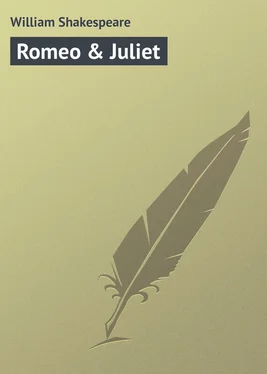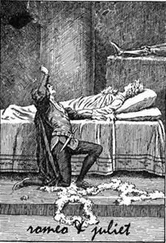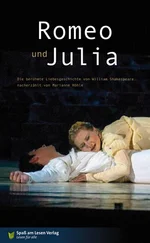William Shakespeare - Romeo & Juliet
Здесь есть возможность читать онлайн «William Shakespeare - Romeo & Juliet» — ознакомительный отрывок электронной книги совершенно бесплатно, а после прочтения отрывка купить полную версию. В некоторых случаях можно слушать аудио, скачать через торрент в формате fb2 и присутствует краткое содержание. Год выпуска: 0101, Жанр: foreign_antique, foreign_prose, на английском языке. Описание произведения, (предисловие) а так же отзывы посетителей доступны на портале библиотеки ЛибКат.
- Название:Romeo & Juliet
- Автор:
- Жанр:
- Год:0101
- ISBN:нет данных
- Рейтинг книги:3 / 5. Голосов: 1
-
Избранное:Добавить в избранное
- Отзывы:
-
Ваша оценка:
- 60
- 1
- 2
- 3
- 4
- 5
Romeo & Juliet: краткое содержание, описание и аннотация
Предлагаем к чтению аннотацию, описание, краткое содержание или предисловие (зависит от того, что написал сам автор книги «Romeo & Juliet»). Если вы не нашли необходимую информацию о книге — напишите в комментариях, мы постараемся отыскать её.
Romeo & Juliet — читать онлайн ознакомительный отрывок
Ниже представлен текст книги, разбитый по страницам. Система сохранения места последней прочитанной страницы, позволяет с удобством читать онлайн бесплатно книгу «Romeo & Juliet», без необходимости каждый раз заново искать на чём Вы остановились. Поставьте закладку, и сможете в любой момент перейти на страницу, на которой закончили чтение.
Интервал:
Закладка:
BENVOLIO:
Madam, an hour before the worshipp’d sun Peer’d forth the golden window of the east, A troubled mind drave me to walk abroad; Where, underneath the grove of sycamore That westward rooteth from the city’s side, So early walking did I see your son: Towards him I made, but he was ware of me And stole into the covert of the wood: I, measuring his affections by my own, That most are busied when they’re most alone, Pursued my humour not pursuing his, And gladly shunn’d who gladly fled from me.
MONTAGUE:
Many a morning hath he there been seen, With tears augmenting the fresh morning dew. Adding to clouds more clouds with his deep sighs; But all so soon as the all-cheering sun Should in the furthest east begin to draw The shady curtains from Aurora’s bed, Away from the light steals home my heavy son, And private in his chamber pens himself, Shuts up his windows, locks far daylight out And makes himself an artificial night: Black and portentous must this humour prove, Unless good counsel may the cause remove.
BENVOLIO:
My noble uncle, do you know the cause?
MONTAGUE:
I neither know it nor can learn of him.
BENVOLIO:
Have you importuned him by any means?
MONTAGUE:
Both by myself and many other friends: But he, his own affections’ counsellor, Is to himself-I will not say how true- But to himself so secret and so close, So far from sounding and discovery, As is the bud bit with an envious worm, Ere he can spread his sweet leaves to the air, Or dedicate his beauty to the sun. Could we but learn from whence his sorrows grow. We would as willingly give cure as know.
Enter ROMEO
BENVOLIO:
See, where he comes: so please you, step aside; I’ll know his grievance, or be much denied.
MONTAGUE:
I would thou wert so happy by thy stay, To hear true shrift. Come, madam, let’s away.
Exeunt MONTAGUE and LADY MONTAGUE
BENVOLIO:
Good-morrow, cousin.
ROMEO:
Is the day so young?
BENVOLIO:
But new struck nine.
ROMEO:
Ay me! sad hours seem long. Was that my father that went hence so fast?
BENVOLIO:
It was. What sadness lengthens Romeo’s hours?
ROMEO:
Not having that, which, having, makes them short.
BENVOLIO:
In love?
ROMEO:
Out- BENVOLIO:
Of love?
ROMEO:
Out of her favour, where I am in love.
BENVOLIO:
Alas, that love, so gentle in his view, Should be so tyrannous and rough in proof!
ROMEO:
Alas, that love, whose view is muffled still, Should, without eyes, see pathways to his will! Where shall we dine? O me! What fray was here? Yet tell me not, for I have heard it all. Here’s much to do with hate, but more with love. Why, then, O brawling love! O loving hate! O any thing, of nothing first create! O heavy lightness! serious vanity! Mis-shapen chaos of well-seeming forms! Feather of lead, bright smoke, cold fire, sick health! Still-waking sleep, that is not what it is! This love feel I, that feel no love in this. Dost thou not laugh?
BENVOLIO:
No, coz, I rather weep.
ROMEO:
Good heart, at what?
BENVOLIO:
At thy good heart’s oppression.
ROMEO:
Why, such is love’s transgression. Griefs of mine own lie heavy in my breast, Which thou wilt propagate, to have it prest With more of thine: this love that thou hast shown Doth add more grief to too much of mine own. Love is a smoke raised with the fume of sighs; Being purged, a fire sparkling in lovers’ eyes; Being vex’d a sea nourish’d with lovers’ tears: What is it else? a madness most discreet, A choking gall and a preserving sweet. Farewell, my coz.
BENVOLIO:
Soft! I will go along; An if you leave me so, you do me wrong.
ROMEO:
Tut, I have lost myself; I am not here; This is not Romeo, he’s some other where.
BENVOLIO:
Tell me in sadness, who is that you love.
ROMEO:
What, shall I groan and tell thee?
BENVOLIO:
Groan! why, no. But sadly tell me who.
ROMEO:
Bid a sick man in sadness make his will: Ah, word ill urged to one that is so ill! In sadness, cousin, I do love a woman.
BENVOLIO:
I aim’d so near, when I supposed you loved.
ROMEO:
A right good mark-man! And she’s fair I love.
BENVOLIO:
A right fair mark, fair coz, is soonest hit.
ROMEO:
Well, in that hit you miss: she’ll not be hit With Cupid’s arrow; she hath Dian’s wit; And, in strong proof of chastity well arm’d, From love’s weak childish bow she lives unharm’d. She will not stay the siege of loving terms, Nor bide the encounter of assailing eyes, Nor ope her lap to saint-seducing gold: O, she is rich in beauty, only poor, That when she dies with beauty dies her store.
BENVOLIO:
Then she hath sworn that she will still live chaste?
ROMEO:
She hath, and in that sparing makes huge waste, For beauty starved with her severity Cuts beauty off from all posterity. She is too fair, too wise, wisely too fair, To merit bliss by making me despair: She hath forsworn to love, and in that vow Do I live dead that live to tell it now.
BENVOLIO:
Be ruled by me, forget to think of her.
ROMEO:
O, teach me how I should forget to think.
BENVOLIO:
By giving liberty unto thine eyes; Examine other beauties.
ROMEO:
’Tis the way To call hers exquisite, in question more: These happy masks that kiss fair ladies’ brows Being black put us in mind they hide the fair; He that is strucken blind cannot forget The precious treasure of his eyesight lost: Show me a mistress that is passing fair, What doth her beauty serve, but as a note Where I may read who pass’d that passing fair? Farewell: thou canst not teach me to forget.
BENVOLIO:
I’ll pay that doctrine, or else die in debt.
Exeunt
Scene 2
A street.
Enter CAPULET, PARIS, and Servant
CAPULET:
But Montague is bound as well as I, In penalty alike; and ’tis not hard, I think, For men so old as we to keep the peace.
PARIS:
Of honourable reckoning are you both; And pity ’tis you lived at odds so long. But now, my lord, what say you to my suit?
CAPULET:
But saying o’er what I have said before: My child is yet a stranger in the world; She hath not seen the change of fourteen years, Let two more summers wither in their pride, Ere we may think her ripe to be a bride.
PARIS:
Younger than she are happy mothers made.
CAPULET:
And too soon marr’d are those so early made. The earth hath swallow’d all my hopes but she, She is the hopeful lady of my earth: But woo her, gentle Paris, get her heart, My will to her consent is but a part; An she agree, within her scope of choice Lies my consent and fair according voice. This night I hold an old accustom’d feast, Whereto I have invited many a guest, Such as I love; and you, among the store, One more, most welcome, makes my number more. At my poor house look to behold this night Earth-treading stars that make dark heaven light: Such comfort as do lusty young men feel When well-apparell’d April on the heel Of limping winter treads, even such delight Among fresh female buds shall you this night Inherit at my house; hear all, all see, And like her most whose merit most shall be: Which on more view, of many mine being one May stand in number, though in reckoning none, Come, go with me.
To Servant, giving a paper
Go, sirrah, trudge about Through fair Verona; find those persons out Whose names are written there, and to them say, My house and welcome on their pleasure stay.
Exeunt CAPULET and PARIS
Servant:
Find them out whose names are written here! It is written, that the shoemaker should meddle with his yard, and the tailor with his last, the fisher with his pencil, and the painter with his nets; but I am sent to find those persons whose names are here writ, and can never find what names the writing person hath here writ. I must to the learned.-In good time.
Читать дальшеИнтервал:
Закладка:
Похожие книги на «Romeo & Juliet»
Представляем Вашему вниманию похожие книги на «Romeo & Juliet» списком для выбора. Мы отобрали схожую по названию и смыслу литературу в надежде предоставить читателям больше вариантов отыскать новые, интересные, ещё непрочитанные произведения.
Обсуждение, отзывы о книге «Romeo & Juliet» и просто собственные мнения читателей. Оставьте ваши комментарии, напишите, что Вы думаете о произведении, его смысле или главных героях. Укажите что конкретно понравилось, а что нет, и почему Вы так считаете.












